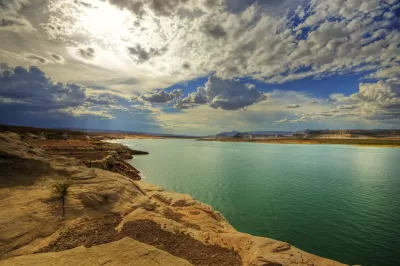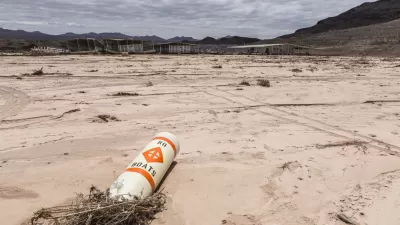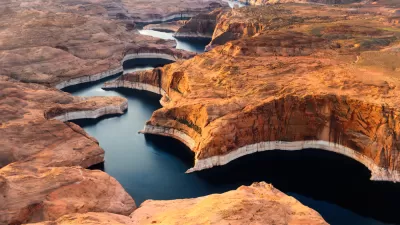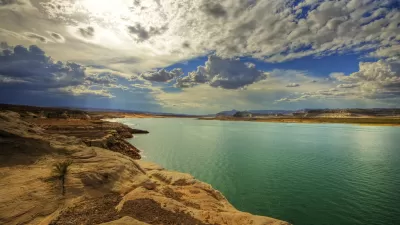As climate changes in the Rockies and the southwest, Lake Powell is gradually shrinking. The debate over Glen Canyon Dam is on again, and this time environmentalists aren't the only ones against it.

The Colorado River has played host to infrastructural drama for almost a century. Now, amidst drought, its formerly vast water supply is shrinking. A debate has reignited "about whether 20th-century solutions can address the challenges of an epochal 21st-century drought, with a growing chorus of prominent former officials saying the plans fly in the face of a new climate reality."
One of the main criticisms is that Lake Powell (and Lake Mead) waste immense quantities of water. Abrahm Lustgarden describes that in what is "perhaps the most egregious failure for a system intended to conserve water, many [reservoirs] lose hundreds of billions of gallons of precious water each year to evaporation and, sometimes, to leakage underground." Phasing out Glen Canyon Dam would save about 179 billion gallons of water a year, enough to supply Los Angeles.
Moreover, Glen Canyon Dam's venerable hydroelectric capacity is declining as climate change plays havoc with its reservoir's water level. "Since the dam's power sales are relied on to pay for the operations of other smaller dams and reservoirs used for irrigation in the West, as Glen Canyon financially crumbles, so might the system that depends on it."
Lustgarden notes that in 2015 alone, six smaller dams were deconstructed in the western states, with four more on the Klamath River on their way out. But the politics around Glen Canyon and the Colorado River are on another level entirely, and so far there hasn't been any real movement on the issue.
FULL STORY: Drought Be Damned: Has the 20th-Century Promise of America’s Dams Run Its Course?

Alabama: Trump Terminates Settlements for Black Communities Harmed By Raw Sewage
Trump deemed the landmark civil rights agreement “illegal DEI and environmental justice policy.”

Study: Maui’s Plan to Convert Vacation Rentals to Long-Term Housing Could Cause Nearly $1 Billion Economic Loss
The plan would reduce visitor accommodation by 25% resulting in 1,900 jobs lost.

Planetizen Federal Action Tracker
A weekly monitor of how Trump’s orders and actions are impacting planners and planning in America.

Wind Energy on the Rise Despite Federal Policy Reversal
The Trump administration is revoking federal support for renewable energy, but demand for new projects continues unabated.

Passengers Flock to Caltrain After Electrification
The new electric trains are running faster and more reliably, leading to strong ridership growth on the Bay Area rail system.

Texas Churches Rally Behind ‘Yes in God’s Back Yard’ Legislation
Religious leaders want the state to reduce zoning regulations to streamline leasing church-owned land to housing developers.
Urban Design for Planners 1: Software Tools
This six-course series explores essential urban design concepts using open source software and equips planners with the tools they need to participate fully in the urban design process.
Planning for Universal Design
Learn the tools for implementing Universal Design in planning regulations.
Caltrans
Smith Gee Studio
Institute for Housing and Urban Development Studies (IHS)
City of Grandview
Harvard GSD Executive Education
Toledo-Lucas County Plan Commissions
Salt Lake City
NYU Wagner Graduate School of Public Service





























